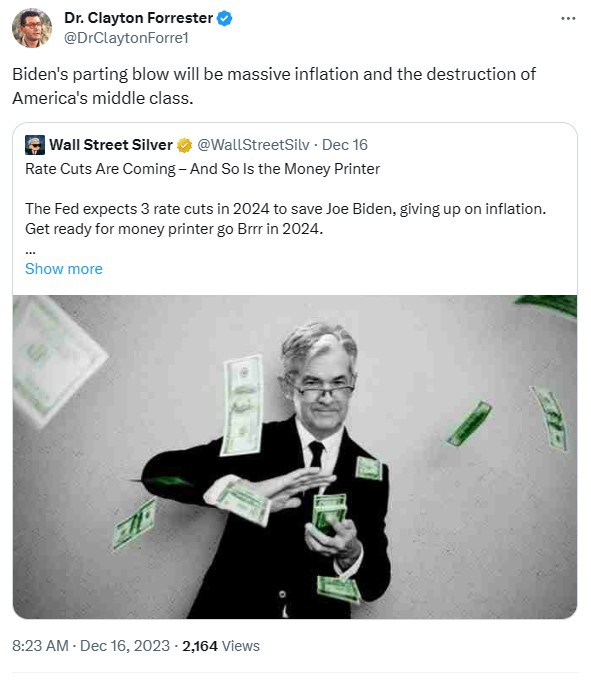Fed Chair, Jerome Powell, is considering a pause in rate hikes, and then three rate cuts in 2024. In response to talks of a pivot, the Dow soared to near all-time highs, with overall market sentiment hyper bullish. However, yesterday stocks plummeted like last week never happened. We are still hearing the same propaganda about a soft landing, with the Fed achieving that goldilocks zone, where inflation is defeated without unemployment rising. The Bears assumed that there would be this epiphany moment, where they would be vindicated and the Bulls would see the light, but so far that has not happened.
Source: financialjuice Twitter
These rate cuts are not set in stone, and Fed speakers are already starting to backtrack on the pivot message. For instance, the New York Fed’s, John Williams, stated that “We aren’t really talking about rate cuts right now,” after Powell said that “Rate cuts are a topic of discussion right now.” Regardless, the pivot does not vindicate the bulls’ soft landing thesis. Rather it is a signal that the Fed is throwing in the towel on fighting inflation, and is worried that higher interest rates will cause something to break in the financial system. The Fed anticipating the lagging effect of rate hikes are the real reason for the pause. Not to mention how big the bubble is, and how invested the Fed is in preventing it from popping.
Source: GeorgeGammon Twitter
We are witnessing a repeat of the 1970s, where the Fed pivoted prematurely and inflation resurged. While inflation is relatively low for now, core inflation is still at 4%. The decline in inflation is a sign of a global economic slowdown, especially in China and Europe. Inflation also went down because of supply chain issues getting resolved from the pandemic and Ukraine war, as well as Biden depleting the Strategic Petroleum Reserves, which now have to be replenished. Mass migration has hidden the cost of inflation while growing the GDP, but at the expense of harming overall quality of life.
Source: Harold36089778 Twitter
Most importantly, a strong dollar has kept inflation at bay. However, the U.S. Dollar Index is now below 102 for the first time since August, and will likely drop below 90 with debt markets anticipating a pivot. Basically a weaker dollar is extremely inflationary. Powell also expressed openness to returning to Quantitative Easing (the Fed printing dollars to purchase treasury bonds), which is obviously inflationary.
The Houthis targeting ships in the Red Sea, looks like another Suez crisis. A lot of major shipping firms, like Maersk and Evergreen, are avoiding the Red Sea. Ships now have to travel all the way under South Africa, adding days to voyages, which means much higher shipping costs. While I don’t think the Red Sea crisis by itself will cause a global economic collapse, it will increase inflation. While the US will be less impacted than Europe, it still means that the Fed will be further behind in the rate hike cycle.
Inflation resurging prematurely is a hurdle for any rate cuts, which means that the US and global economy are screwed. Being behind on the cycle means that either the Fed will have to sustain higher rates or pivot and let inflation soar. While I don’t think Powell wants to go down in history as another Arthur Burns, and has been more hawkish than anticipated, there is a chance that the Fed will pivot because of the election.
Source: GameofTrades Twitter
The economy and financial system depends upon growth and liquidity, and higher interest rates means ultra-high interest on the National Debt, and debt in general. Plus a credit crunch would shut down the entire financial system. For these reasons, expect the Fed to eventually give up and allow inflation to soar. Yields show that the probability of a recession is still high and job openings are beginning to collapse. Bonds are now indicating major signs of danger, which is because there is declining interest in purchasing US debt. The most likely scenario is some hybrid of 70s’ stagflation with a financial crash like 2008.









